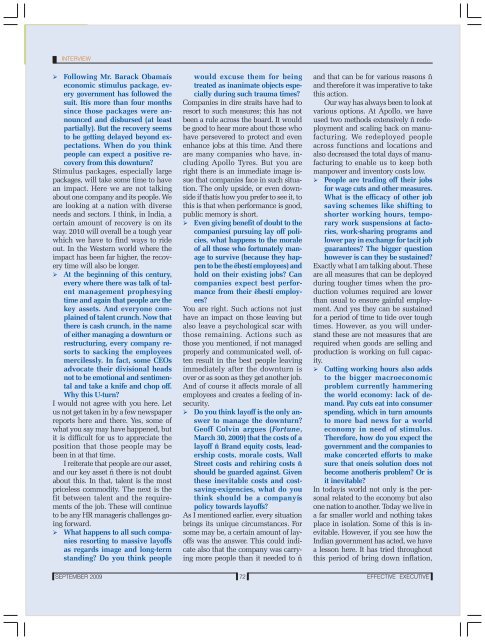Social Cause Marketing - The Regis Group Inc
Social Cause Marketing - The Regis Group Inc
Social Cause Marketing - The Regis Group Inc
You also want an ePaper? Increase the reach of your titles
YUMPU automatically turns print PDFs into web optimized ePapers that Google loves.
INTERVIEW<br />
<br />
Following Mr. Barack Obamaís<br />
economic stimulus package, every<br />
government has followed the<br />
suit. Itís more than four months<br />
since those packages were announced<br />
and disbursed (at least<br />
partially). But the recovery seems<br />
to be getting delayed beyond expectations.<br />
When do you think<br />
people can expect a positive recovery<br />
from this downturn?<br />
Stimulus packages, especially large<br />
packages, will take some time to have<br />
an impact. Here we are not talking<br />
about one company and its people. We<br />
are looking at a nation with diverse<br />
needs and sectors. I think, in India, a<br />
certain amount of recovery is on its<br />
way. 2010 will overall be a tough year<br />
which we have to find ways to ride<br />
out. In the Western world where the<br />
impact has been far higher, the recovery<br />
time will also be longer.<br />
At the beginning of this century,<br />
every where there was talk of talent<br />
management prophesying<br />
time and again that people are the<br />
key assets. And everyone complained<br />
of talent crunch. Now that<br />
there is cash crunch, in the name<br />
of either managing a downturn or<br />
restructuring, every company resorts<br />
to sacking the employees<br />
mercilessly. In fact, some CEOs<br />
advocate their divisional heads<br />
not to be emotional and sentimental<br />
and take a knife and chop off.<br />
Why this U-turn?<br />
I would not agree with you here. Let<br />
us not get taken in by a few newspaper<br />
reports here and there. Yes, some of<br />
what you say may have happened, but<br />
it is difficult for us to appreciate the<br />
position that those people may be<br />
been in at that time.<br />
I reiterate that people are our asset,<br />
and our key asset ñ there is not doubt<br />
about this. In that, talent is the most<br />
priceless commodity. <strong>The</strong> next is the<br />
fit between talent and the requirements<br />
of the job. <strong>The</strong>se will continue<br />
to be any HR managerís challenges going<br />
forward.<br />
What happens to all such companies<br />
resorting to massive layoffs<br />
as regards image and long-term<br />
standing? Do you think people<br />
would excuse them for being<br />
treated as inanimate objects especially<br />
during such trauma times?<br />
Companies in dire straits have had to<br />
resort to such measures; this has not<br />
been a rule across the board. It would<br />
be good to hear more about those who<br />
have persevered to protect and even<br />
enhance jobs at this time. And there<br />
are many companies who have, including<br />
Apollo Tyres. But you are<br />
right there is an immediate image issue<br />
that companies face in such situation.<br />
<strong>The</strong> only upside, or even downside<br />
if thatís how you prefer to see it, to<br />
this is that when performance is good,<br />
public memory is short.<br />
Even giving benefit of doubt to the<br />
companiesí pursuing lay off policies,<br />
what happens to the morale<br />
of all those who fortunately manage<br />
to survive (because they happen<br />
to be the ëbestí employees) and<br />
hold on their existing jobs? Can<br />
companies expect best performance<br />
from their ëbestí employees?<br />
You are right. Such actions not just<br />
have an impact on those leaving but<br />
also leave a psychological scar with<br />
those remaining. Actions such as<br />
those you mentioned, if not managed<br />
properly and communicated well, often<br />
result in the best people leaving<br />
immediately after the downturn is<br />
over or as soon as they get another job.<br />
And of course it affects morale of all<br />
employees and creates a feeling of insecurity.<br />
Do you think layoff is the only answer<br />
to manage the downturn?<br />
Geoff Colvin argues (Fortune,<br />
March 30, 2009) that the costs of a<br />
layoff ñ Brand equity costs, leadership<br />
costs, morale costs, Wall<br />
Street costs and rehiring costs ñ<br />
should be guarded against. Given<br />
these inevitable costs and costsaving-exigencies,<br />
what do you<br />
think should be a companyís<br />
policy towards layoffs?<br />
As I mentioned earlier, every situation<br />
brings its unique circumstances. For<br />
some may be, a certain amount of layoffs<br />
was the answer. This could indicate<br />
also that the company was carrying<br />
more people than it needed to ñ<br />
and that can be for various reasons ñ<br />
and therefore it was imperative to take<br />
this action.<br />
Our way has always been to look at<br />
various options. At Apollo, we have<br />
used two methods extensively ñ redeployment<br />
and scaling back on manufacturing.<br />
We redeployed people<br />
across functions and locations and<br />
also decreased the total days of manufacturing<br />
to enable us to keep both<br />
manpower and inventory costs low.<br />
People are trading off their jobs<br />
for wage cuts and other measures.<br />
What is the efficacy of other job<br />
saving schemes like shifting to<br />
shorter working hours, temporary<br />
work suspensions at factories,<br />
work-sharing programs and<br />
lower pay in exchange for tacit job<br />
guarantees? <strong>The</strong> bigger question<br />
however is can they be sustained?<br />
Exactly what I am talking about. <strong>The</strong>se<br />
are all measures that can be deployed<br />
during tougher times when the production<br />
volumes required are lower<br />
than usual to ensure gainful employment.<br />
And yes they can be sustained<br />
for a period of time to tide over tough<br />
times. However, as you will understand<br />
these are not measures that are<br />
required when goods are selling and<br />
production is working on full capacity.<br />
Cutting working hours also adds<br />
to the bigger macroeconomic<br />
problem currently hammering<br />
the world economy: lack of demand.<br />
Pay cuts eat into consumer<br />
spending, which in turn amounts<br />
to more bad news for a world<br />
economy in need of stimulus.<br />
<strong>The</strong>refore, how do you expect the<br />
government and the companies to<br />
make concerted efforts to make<br />
sure that oneís solution does not<br />
become anotherís problem? Or is<br />
it inevitable?<br />
In todayís world not only is the personal<br />
related to the economy but also<br />
one nation to another. Today we live in<br />
a far smaller world and nothing takes<br />
place in isolation. Some of this is inevitable.<br />
However, if you see how the<br />
Indian government has acted, we have<br />
a lesson here. It has tried throughout<br />
this period of bring down inflation,<br />
SEPTEMBER 2009<br />
72<br />
EFFECTIVE EXECUTIVE








